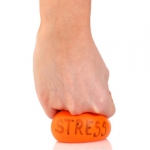 Stress is the body’s reaction to some sort of pressure or tension that is often coming from an external source. Sometimes the stress is physical, such as when the body has to physically fight back against excess weight or tension while completing certain tasks. In other situations the stress is psychological, building up in our minds until our bodies start reacting to it physically. Most often when we talk about stress we are referring to psychological stress.
Stress is the body’s reaction to some sort of pressure or tension that is often coming from an external source. Sometimes the stress is physical, such as when the body has to physically fight back against excess weight or tension while completing certain tasks. In other situations the stress is psychological, building up in our minds until our bodies start reacting to it physically. Most often when we talk about stress we are referring to psychological stress.
Stress can cause serious health deterioration and often prompts poor habits that can interfere with your weight loss efforts. Following weight loss surgery it is best that you develop strategies to efficiently manage your stress so that it doesn’t hinder the work you’ve put towards improving your health.
Recognizing Stress Triggers
A stress trigger is something that causes you tension or strain. Some stress triggers are common, but there are also aspects of your life that are stressful to you in personal ways that may not be evident to outsiders. These are still stress triggers, but they are often more difficult to recognize.
The most common stress triggers include:
- Financial issues
- Health concerns
- Career dissatisfaction
- Caregiving responsibilities
- Relationship trouble
- Family issues
- Lack of time
- Holiday pressure
- Desire for perfection
These triggers are often responsible for chronic stress; that is stress that lasts for a prolonged period time—often longer than several weeks. When we are stressed, our bodies react through a series of biochemical, behavioral and psychological ways. These are considered the symptoms of stress, and they include:
- Tension and migraine headaches
- Difficulty sleeping
- Stomach aches
- Weight gain and tendencies to overeat
- Acne and skin rash development
- Difficulty concentrating
Everyone reacts to stress in slightly different ways. To manage your stress efficiently, it is necessary to understand what is prompting stress in your life, as well as how you commonly react to it. One of the best ways to do this is through journaling.
Keeping a regular journal can help you draw connections between the events in your life that are causing you stress and how you react to them. Once you understand what your stress triggers are you can take steps to start managing that stress, such as through deep breathing techniques or regular exercise.


